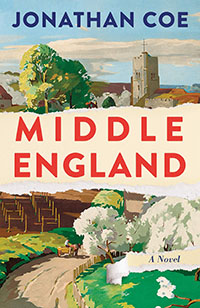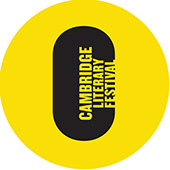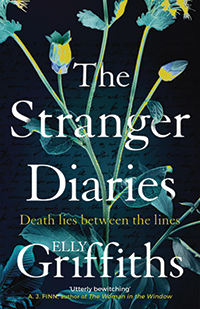Bringing you top new fiction picks, author interviews, discounts and lots more book chat, the Edition Book Club is a partnership with Cambridge Literary Festival and Heffers
Middle England by Jonathan Coe
Interview by Charlotte Griffiths
Jonathan Coe’s new novel Middle England sees characters first encountered in the writer’s earlier books, The Rotters’ Club and The Closed Circle, playing out their lives against the eight years of actually-quite-tumultuous British history between 2010 and 2018. Deaths, marriages and births, elections, the Olympics, the London riots and – of course – Brexit.
Described as the ‘first great post-Brexit novel’, the final few chapters of Middle England are set in September 2018, but were written earlier this year. Since finishing in May, Jonathan’s had his fingers crossed that nothing too dramatic would happen to undo his prophetic writing. “I did undergo a couple of anxious months where I thought ‘maybe something incredibly drastic is going to happen – Brexit’s going to be reversed, or Trump’s going to go to war with North Korea’,” he says, “but the world just seems to be trundling along in the same desperate muddle as it was while I was writing the book.”
It’s been three years since the publication of Jonathan’s last book, Number Eleven. “I have these long periods of recovery after finishing a novel where people ask me what I’ve been doing and I’m honestly unable to tell them,” he says. “Time just seems to dribble away. I didn’t start writing Middle England – or even thinking about it, actually – until just after the referendum in 2016. Of all my recent books, it’s the one I’ve written most quickly – it took about 12 months from start to finish.”

When Jonathan was researching What a Carve Up!, first published 24 years ago, it was much harder to track down published information to use as reference material. “Now you have this double-edged sword where you can basically find out anything you want on the Internet in about five minutes, but you slightly miss that human contact of actually meeting someone who’s on the front line of things,” he says. “To my memory, apart from talking to a parliamentary researcher about an MP’s work-life balance, most of the research [for Middle England] was done online or by reading newspapers – it’s my very direct response to what we were all seeing and reading about in the media. I just wanted to put on record my perspective of what it felt like to live through the last eight years, to get it down on paper.”
His feeling is that we’re living through a time where recent history very rapidly becomes ancient history. “Everything’s moving so fast and so drastically that it’s hard to remember. For instance, when I was writing about the 2015 elections, I suddenly remembered what a huge moment that felt like,” he says. “We’d all been absolutely convinced that Ed Miliband’s Labour would, at the very least, make sufficient inroads for a hung parliament – and Labour supporters woke up the next morning with an incredible feeling of defeat and disbelief, but hardly anyone seems to talk about that election any more. Similarly with the 2011 riots, which were such a strange and disturbing moment in recent British history, but they hardly seem to figure in the public memory – it was only seven years ago.”
“I want to put these things in a book purely to remind people that they’d happened. We’ve become so amnesiac, swept up in the current of the now.”
Middle England differs from Jonathan’s other novels in that there isn’t really a main storyline – it’s documentary-like, following the characters’ lives against the framework of current events. “It’s the story of Britain over the past eight years,” he says, “and it was a question of taking these characters and seeing how they reacted to the events.”
Although Jonathan might not have started with a plot, he did have a structure: his writing process began with the definite knowledge that the book would take the form of 45 sections, each about 3,000 words long. “That gave me the length and proportions of the book, and it was a question of weaving in as many episodes from public life and the characters’ private lives as I could within those dimensions,” he says. “I did something I’ve never done before, which was to use handwritten index cards, numbered from one to 45. I then worked out the main narrative points and started shuffling them together. It’s what screenwriters used to do, I think, before computers and, for some reason, it seemed like it was the right sort of approach for this book.”
The English Literature student in me raises her hand. I ask: “This strikes me as somewhat reminiscent of the current British political situation with regards to Brexit: we don’t have a plot or a story, but we have a time frame and a structure, where no-one seems to know what’s going on… but we know we’ve got to do it all by March next year.”
Jonathan laughs at this. “That’s a good analogy. You can have that one,” he replies.
There is a beautiful set piece in the 15th section of the book, one third of the way through Jonathan’s structure. The chapter sees the majority of the characters sat in their respective homes, watching the opening ceremony of the 2012 Summer Olympics. Jonathan’s own experience of this cultural event echoed that of one of his characters, Philip Chase.
“I sat down with my family and thought, ‘well, this isn’t going to be very interesting, but I’ll watch it because it’s a national moment’, and was caught up in its energy and its brilliance.” Inspired, Jonathan immediately went to his computer and bought tickets for one of the Olympic events: “We ended up watching women’s football at Wembley Stadium, which I never would have done before,” he says.
“It was such a joyful and inventive celebration of the state of Britishness in 2012. Like a lot of people, I look back at it now and think about this Festival of Brexit Britain, which Theresa May is proposing for exactly ten years later, and somehow it’s not so easy to summon the enthusiasm for it. Maybe I’ll be proved wrong.”
Cathy Moore, director of Cambridge Literary Festival, on Middle England

I read the selection for this month’s book club while on holiday in the idyllic Languedoc-Roussillon region of France, where we found seasonal apricots and figs in abundance, the grape harvest in full swing – carefully and painstakingly hand-picked on small family run vineyards – a boulangerie or two in every village plus bountiful markets with cheese, charcuterie, honey and a cornucopia of fruit and vegetables. In many ways, this was a far cry from the Middle England depicted in Jonathan Coe’s latest novel of the same name. Middle England portrays our divided country with Coe’s characteristic humour, intelligence and compassion. Set in the Midlands and London over the last eight years, Coe follows his vivid and brilliant characters through a time of immense change and disruption in Britain. This is a novel for now, which confronts the absurdity of the situation we find ourselves in at the hands of the political classes and tells the story of England: a story of nostalgia, bewilderment, confusion, humour, friendship, love and rage. Two other wonderful, but very different, books that cover similar themes are Amanda Craig’s The Lie of the Land and Ali Smith’s Autumn.
You can see Jonathan Coe talking about Middle England at Cambridge Literary Festival on Saturday 24 November at 1pm. For full details, visit cambridgeliteraryfestival.com
Up next month: The Stranger Diaries by Elly Griffiths 
With a winter chill in the air, now is the time to cosy up with a page-turning thriller – and we’ve got just the thing. The latest book from crime novelist Elly Griffiths, The Stranger Diaries immerses you in a gothic tale which twists and turns, masterfully building suspense. It follows Clare Cassidy, a literature teacher specialising in gothic writer RM Holland, whose life and work collide horrifyingly when a colleague is found dead; a line from Holland placed by her corpse.
The police become convinced that the key to the murder lies in Holland’s writing, but Clare is fearful that the killer is someone she knows. Not knowing who to trust, she confides her darkest thoughts to her journal. Then one day she notices some other writing in the diary. The writing isn’t hers…
The Stranger Diaries is available to purchase at Heffers. Read along and tweet us your thoughts @cambsedition, with the hashtag #EditionBookClub for a chance to feature in the next issue.
IN ASSOCIATION WITH

Look out for the Cambridge Edition book club stickers in Heffers and get money off our monthly pick. Heffers is at 20 Trinity Street, Cambridge Blackwells.co.uk

